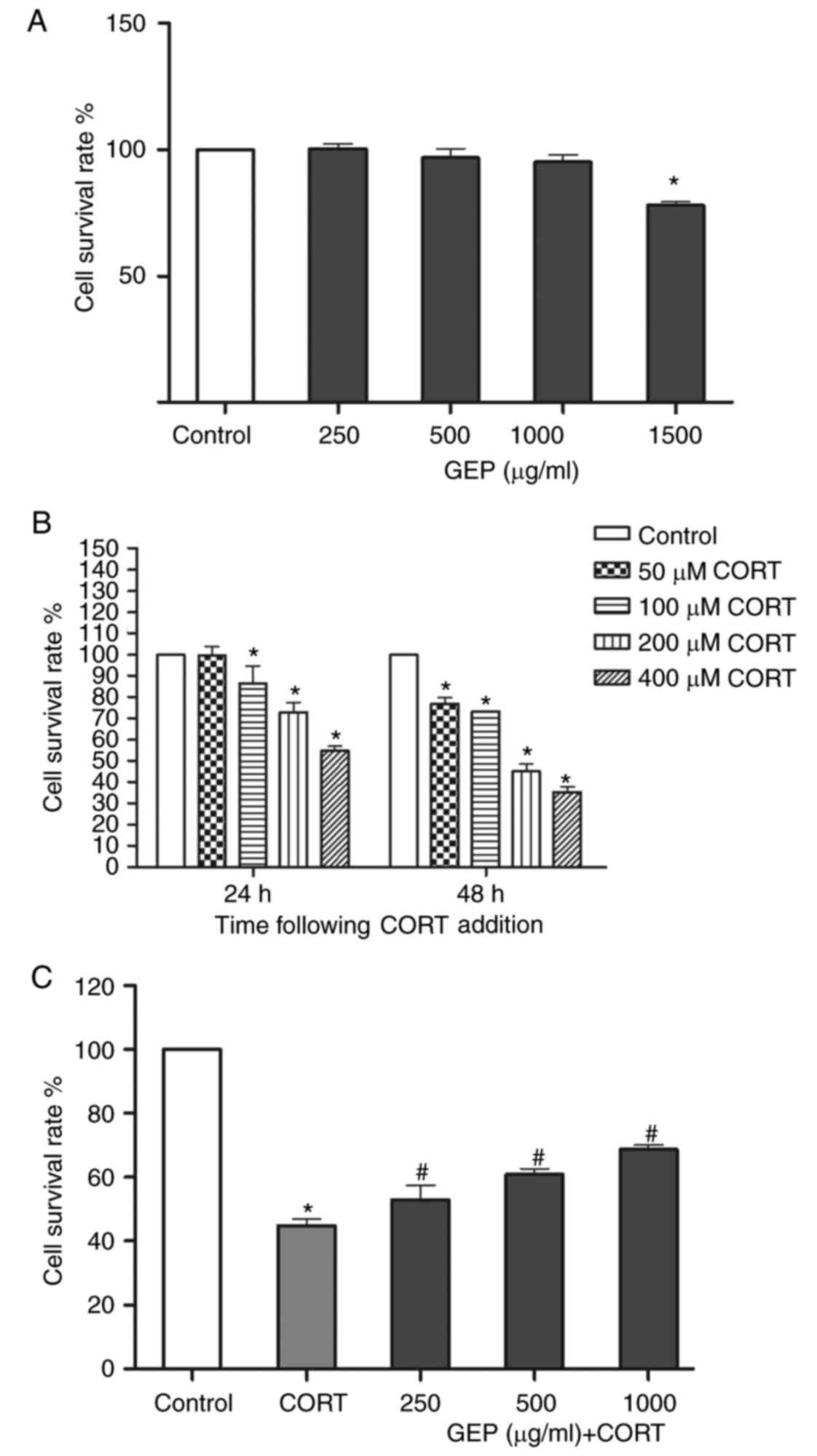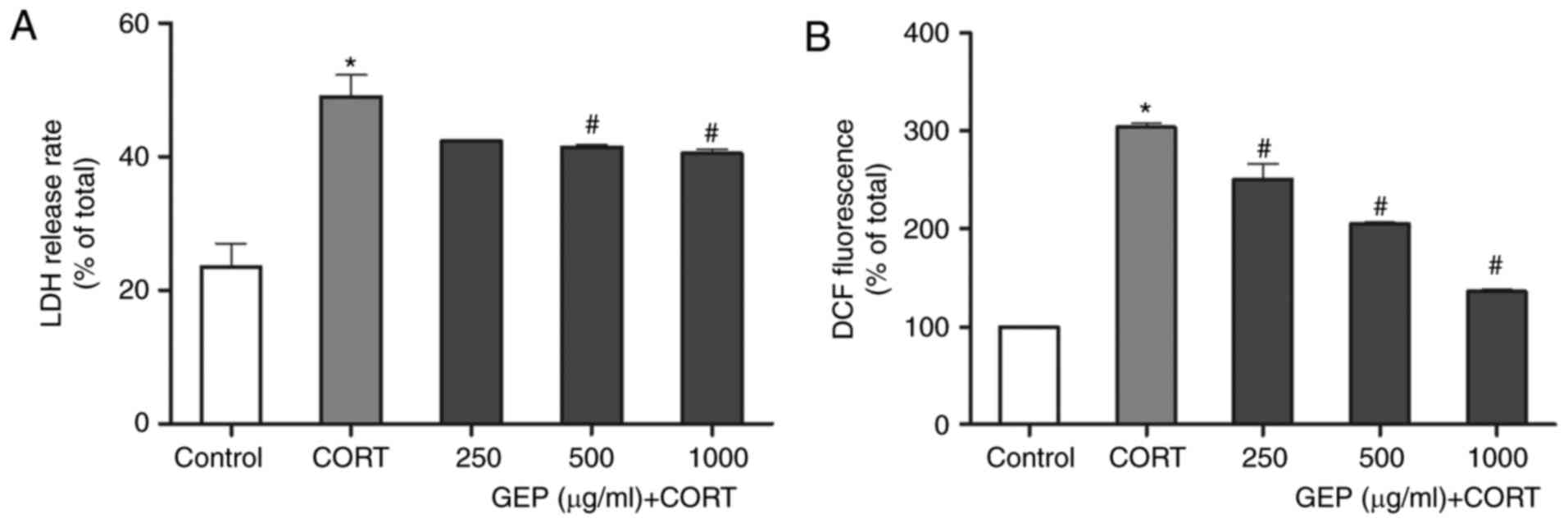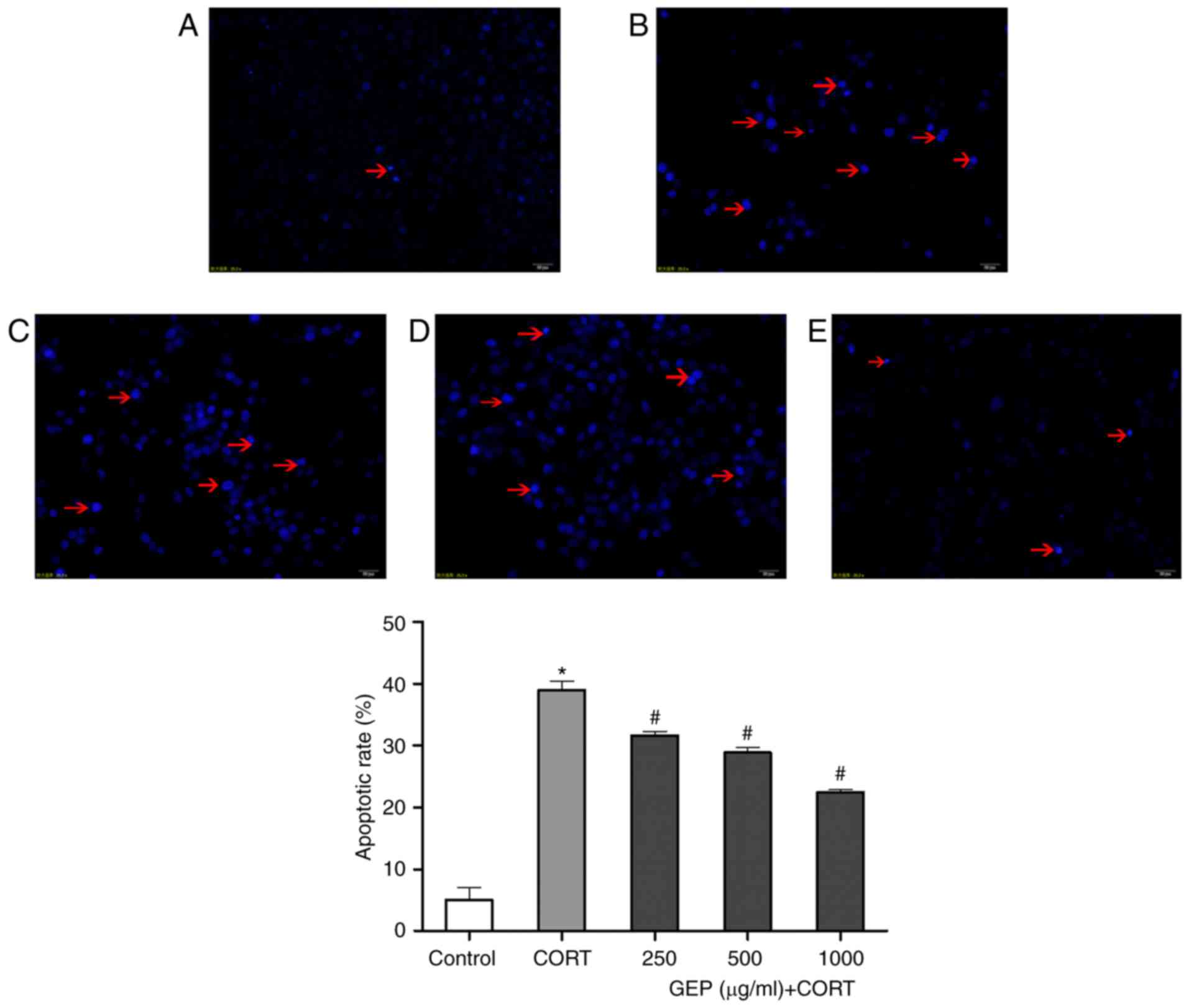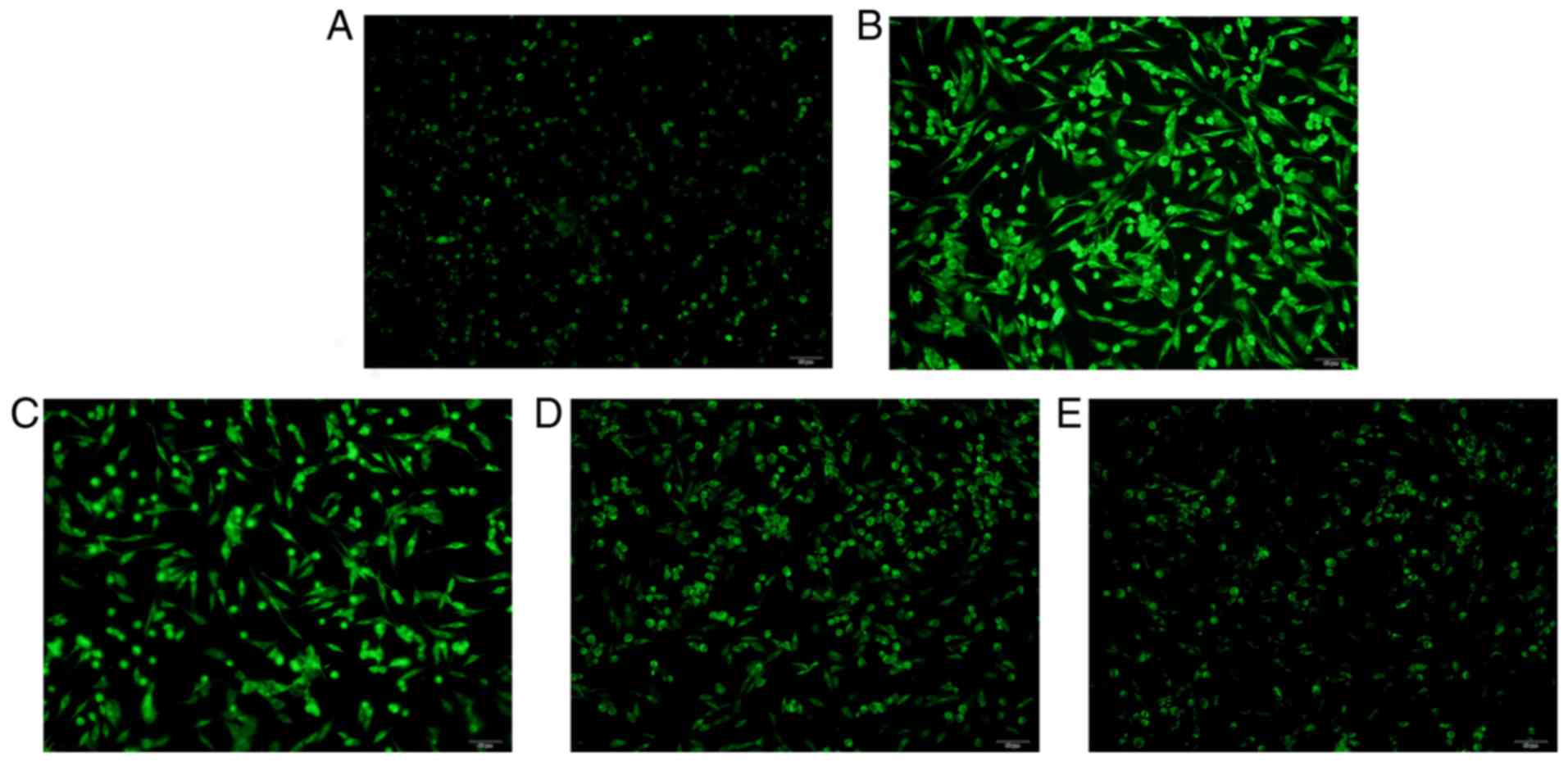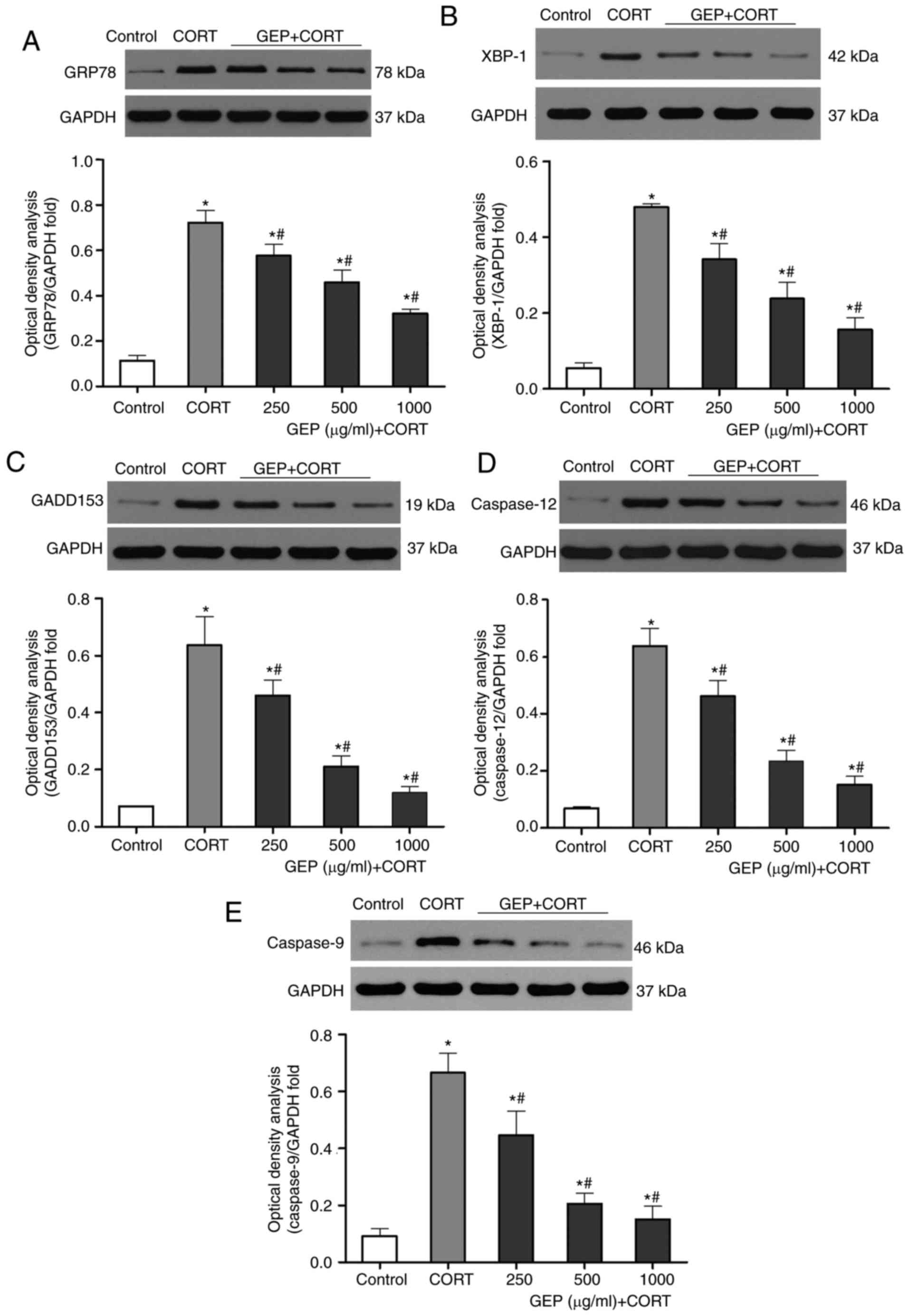|
1
|
Clark DB, Bukstein O and Cornelius J:
Alcohol use disorders in adolescents: Epidemiology, diagnosis,
psychosocial interventions, and pharmacological treatment. Paediatr
Drugs. 4:493–502. 2002. View Article : Google Scholar : PubMed/NCBI
|
|
2
|
Dennis CL and Dowswell T: Interventions
(other than pharmacological, psychosocial or psychological) for
treating antenatal depression. Cochrane Database Syst Rev:
CD006795. 2013. View Article : Google Scholar
|
|
3
|
Zhang K, Zhu Y, Zhu Y, Wu S, Liu H, Zhang
W, Xu C, Zhang H, Hayashi T and Tian M: Molecular, Functional, and
structural imaging of major depressive disorder. Neurosci Bull.
32:273–285. 2016. View Article : Google Scholar : PubMed/NCBI
|
|
4
|
World Health Organization (WHO):
Depression fact sheet. WHO; Geneva: 2017, http://www.who.int/mediacentre/factsheets/fs369/en/Updated
February 2017.
|
|
5
|
Jiangsu New Medical College: Chinese
Medicine Dictionary. Shanghai Scientific and Technological Press;
Shanghai: 1979, (In Chinese).
|
|
6
|
An H, Kim IS, Koppula S, Kim BW, Park PJ,
Lim BO, Choi WS, Lee KH and Choi DK: Protective effects of
Gastrodia elata Blume on MPP+−induced
cytotoxicity in human dopaminergic SH-SY5Y cells. J Ethnopharmacol.
130:290–298. 2010. View Article : Google Scholar : PubMed/NCBI
|
|
7
|
Jiang G, Hu Y, Liu L, Cai J, Peng C and Li
Q: Gastrodin protects against MPP+-induced oxidative stress by up
regulates heme oxygenase-1 expression through p38 MAPK/Nrf2 pathway
in human dopaminergic cells. Neurochem Int. 75:79–88. 2014.
View Article : Google Scholar : PubMed/NCBI
|
|
8
|
Lee OH, Kim KI, Han CK, Kim YC and Hong
HD: Effects of acidic polysaccharides from Gastrodia rhizome
on systolic blood pressure and serum lipid concentrations in
spontaneously hypertensive rats fed a high-fat diet. Int J Mol Sci.
13:698–709. 2012. View Article : Google Scholar : PubMed/NCBI
|
|
9
|
Qiu H, Tang W, Tong X, Ding K and Zuo J:
Structure elucidation and sulfated derivatives preparation of two
alpha-D-glucans from Gastrodia elata Bl. and their
anti-dengue virus bioactivities. Carbohyd Res. 342:2230–2236. 2007.
View Article : Google Scholar
|
|
10
|
Zhou BH, Li XJ, Liu M, Wu Z and Ming Hu X:
Antidepressent-like activity of the Gastrodia elata ethanol
extract in mice. Fitotorapia. 77:592–594. 2007. View Article : Google Scholar
|
|
11
|
Li ZY, Guo Z, Liu YM, Liu XM, Chang Q,
Liao YH and Pan RL: Neuroprotective effects of total saikosaponins
of Bupleurum yinchowense on corticosterone-induced apoptosis in
PC12 cells. J Ethnopharmacol. 148:794–803. 2013. View Article : Google Scholar : PubMed/NCBI
|
|
12
|
Mao QQ, Huang Z, Ip SP, Xian YF and Che
CT: Protective effects of piperine against corticosterone-induced
neurotoxicity in PC12 cells. Cell Mol Neurobiol. 32:531–537. 2012.
View Article : Google Scholar : PubMed/NCBI
|
|
13
|
Zhou YZ, Li X, Gong WX, Tian JS, Gao XX,
Gao L, Zhang X, Du GH and Qin XM: Protective effect of
isoliquiritin against corticosterone-induced neurotoxicity in PC12
cells. Food Funct. 8:1235–1244. 2017. View Article : Google Scholar : PubMed/NCBI
|
|
14
|
Aihara M, Ida I, Yuuki N, Oshima A, Kumano
H, Takahashi K, Fukuda M, Oriuchi N, Endo K, Matsuda H and Mikuni
M: HPA axis dysfunction in unmedicated major depressive disorder
and its normalization by pharmacotherapy correlates with alteration
of neural activity in prefrontal cortex and limbic/paralimbic
regions. Psychiatry Res. 155:245–256. 2007. View Article : Google Scholar : PubMed/NCBI
|
|
15
|
Murray F, Smith DW and Hutson PH: Chronic
low dose corticosterone exposure decreased hippocampal cell
proliferation, volume and induced anxiety and depression like
behaviours in mice. Eur J Pharmacol. 583:115–127. 2008. View Article : Google Scholar : PubMed/NCBI
|
|
16
|
Johnson SA, Fournier NM and Kalynchuk LE:
Effect of different doses of corticosterone on depression-like
behavior and HPA axis responses to a novel stressor. Behav Brain
Res. 168:280–288. 2006. View Article : Google Scholar : PubMed/NCBI
|
|
17
|
Jiang Y, Li Z, Liu Y, Liu X, Chang Q, Liao
Y and Pan R: Neuroprotective effect of water extract of Panax
ginseng on corticosterone-induced apoptosis in PC12 cells and its
underlying molecule mechanisms. J Ethnopharmacol. 159:102–112.
2015. View Article : Google Scholar : PubMed/NCBI
|
|
18
|
Li M, Zhou J, Qian J, Cheng X, Wu H, Li L,
Qian C, Su J, Wu D, Burns L, et al: Target genes involved in
corticosterone-induced PC12 cell viability and neurite disorders: A
potential molecular mechanism of major depressive disorder.
Psychiat Res. 235:206–208. 2016. View Article : Google Scholar
|
|
19
|
Zhang H, Liu B, Wu J, Xu C, Tao J, Duan X,
Cao Y and Dong J: Icariin inhibits corticosterone-induced apoptosis
in hypothalamic neurons via the P13-K/Akt signaling pathway. Mol
Med Rep. 6:967–972. 2012. View Article : Google Scholar : PubMed/NCBI
|
|
20
|
Zhu Z, Yang R, Fu X, Wang YQ and Wu GC:
Astrocyte-conditioned medium protecting hippocampal neurons in
primary cultures against corticosterone-induced damages via
PI3-K/Akt signal pathway. Brain Res. 1114:1–10. 2006. View Article : Google Scholar : PubMed/NCBI
|
|
21
|
Liu Y, Shen S, Li Z, Jiang Y, Si J, Chang
Q, Liu X and Pan R: Cajaninstilbene acid protects
corticosterone-induced injury in PC12 cells by inhibiting oxidative
and endoplasmic reticulum stress-mediated apoptosis. Neurochem Int.
78:43–52. 2014. View Article : Google Scholar : PubMed/NCBI
|
|
22
|
Zhou B, Liang Y, Shen H, et al: Protective
effects of polysaccharides of Gastrodia elata blume against
corticosterone-induced apoptosis in PC12 cells. J Chinese Med
Material. 630–633. 2013.(In Chinese).
|
|
23
|
van Vliet AR and Agostinis P: When under
pressure, get closer: PERKing up membrane contact sites during ER
stress. Biochem Soc Trans. 44:499–504. 2016. View Article : Google Scholar : PubMed/NCBI
|
|
24
|
Dias V, Junn E and Mouradian MM: The role
of oxidative stress in parkinson's disease. J Parkinson Dis.
3:461–491. 2013.
|
|
25
|
Valko M, Leibfritz D, Moncol J, Cronin MT,
Mazur M and Telser J: Free radicals and antioxidants in normal
physiological functions and human disease. Int J Biochem Cell Biol.
39:44–84. 2007. View Article : Google Scholar : PubMed/NCBI
|
|
26
|
Pohanka M: Alzheimer's disease and
oxidative stress: A review. Curr Med Chem. 21:356–364. 2014.
View Article : Google Scholar : PubMed/NCBI
|
|
27
|
James SJ, Cutler P, Melnyk S, Jernigan S,
Janak L, Gaylor DW and Neubrander JA: Metabolic biomarkers of
increased oxidative stress and impaired methylation capacity in
children with autism. Am J Clin Nutr. 80:1611–1617. 2004.PubMed/NCBI
|
|
28
|
Kennedy G, Spence VA, McLaren M, Hill A,
Underwood C and Belch JJ: Oxidative stress levels are raised in
chronic fatigue syndrome and are associated with clinical symptoms.
Free Radical Bio Med. 39:584–589. 2005. View Article : Google Scholar
|
|
29
|
Jiménez-Fernández S, Gurpegui M,
Díaz-Atienza F, Pérez-Costillas L, Gerstenberg M and Correll CU:
Oxidative stress and antioxidant parameters in patients with major
depressive disorder compared to healthy controls before and after
antidepressant treatment: Results from a meta-analysis. J Clin
Psychiat. 76:1658–1667. 2015. View Article : Google Scholar
|
|
30
|
Parellada M, Moreno C, Mac-Dowell K, Leza
JC, Giraldez M, Bailón C, Castro C, Miranda-Azpiazu P, Fraguas D
and Arango C: Plasma antioxidant capacity is reduced in Asperger
syndrome. J Psychiatr Res. 46:394–401. 2012. View Article : Google Scholar : PubMed/NCBI
|
|
31
|
De la Monte SM and Tong M: Brain metabolic
dysfunction at the core of Alzheimer's disease. Biochem Pharmacol.
88:548–559. 2014. View Article : Google Scholar : PubMed/NCBI
|
|
32
|
Ozcan U, Cao Q, Yilmaz E, Lee AH, Iwakoshi
NN, Ozdelen E, Tuncman G, Görgün C, Glimcher LH and Hotamisligil
GS: Endoplasmic reticulum stress links obesity, insulin action, and
type 2 diabetes. Science. 306:457–461. 2004. View Article : Google Scholar : PubMed/NCBI
|
|
33
|
Ng TB, He JS, Niu SM, Zhao L, Pi ZF, Shao
W and Liu F: A gallic acid derivative and polysaccharides with
antioxidative activity from rose (Rosa rugosa) flowers. J Pharm
Pharmacol. 56:537–545. 2004. View Article : Google Scholar : PubMed/NCBI
|
|
34
|
Tuvaanjav S, Shuqin H, Komata M, Ma C,
Kanamoto T, Nakashima H and Yoshida T: Isolation and antiviral
activity of water-soluble Cynomorium songaricum Rupr.
polysaccharides. J Asian Nat Prod Res. 18:159–171. 2016. View Article : Google Scholar : PubMed/NCBI
|
|
35
|
Banjerdpongchai R, Kongtawelert P,
Khantamat O, Srisomsap C, Chokchaichamnankit D, Subhasitanont P and
Svasti J: Mitochondrial and endoplasmic reticulum stress pathways
cooperate in zearalenone-induced apoptosis of human leukemic cells.
J Hematol Oncol. 3:502010. View Article : Google Scholar : PubMed/NCBI
|
|
36
|
Banjerdpongchai R, Punyati P, Nakrob A,
Pompimon W and Kongtawelert P: 4′-Hydroxycinnamaldehyde from
Alpinia galanga (Linn.) induces human leukemic cell apoptosis via
mitochondrial and endoplasmic reticulum stress pathways. Asian Pac
J Cancer P. 12:593–598. 2011.
|
|
37
|
Sardão VA, Oliveira PJ, Holy J, Oliveira
CR and Wallace KB: Morphological alterations induced by doxorubicin
on H9c2 myoblasts: Nuclear, mitochondrial, and cytoskeletal
targets. Cell Biol Toxicol. 25:227–243. 2009. View Article : Google Scholar : PubMed/NCBI
|
|
38
|
Bernuzzi F, Recalcati S, Alberghini A and
Cairo G: Reactive oxygen species-independent apoptosis in
doxorubicin-treated H9c2 cardiomyocytes: Role for heme oxygenase-1
down-modulation. Chem Biol Interact. 177:12–20. 2009. View Article : Google Scholar : PubMed/NCBI
|
|
39
|
Atale N, Gupta S, Yadav UC and Rani V:
Cell-death assessment by fluorescent and nonfluorescent cytosolic
and nuclear staining techniques. J Microsc. 255:7–19. 2014.
View Article : Google Scholar : PubMed/NCBI
|
|
40
|
McIntosh LJ and Sapolsky RM:
Glucocorticoids increase the accumulation of reactive oxygen
species and enhance adriamycin-induced toxicity in neuronal
culture. Exp Neurol. 141:201–206. 1996. View Article : Google Scholar : PubMed/NCBI
|
|
41
|
McIntosh LJ, Cortopassi KM and Sapolsky
RM: Glucocorticoids may alter antioxidant enzyme capacity in the
brain: Kainic acid studies. Brain Res. 791:215–222. 1998.
View Article : Google Scholar : PubMed/NCBI
|
|
42
|
Zhou Y, Shu F, Liang X, Chang H, Shi L,
Peng X, Zhu J and Mi M: Ampelopsin induces cell growth inhibition
and apoptosis in breast cancer cells through ROS generation and
endoplasmic reticulum stress pathway. PLoS One. 9:e890212014.
View Article : Google Scholar : PubMed/NCBI
|
|
43
|
Lucassen PJ, Müller MB, Holsboer F, Bauer
J, Holtrop A, Wouda J, Hoogendijk WJ, De Kloet ER and Swaab DF:
Hippocampal apoptosis in major depression is a minor event and
absent from subareas at risk for glucocorticoid overexposure. Am J
Pathol. 158:453–468. 2001. View Article : Google Scholar : PubMed/NCBI
|
|
44
|
Rutkowski DT and Kaufman RJ: A trip to the
ER: Coping with stress. Trends Cell Biol. 14:20–28. 2004.
View Article : Google Scholar : PubMed/NCBI
|
|
45
|
Shapiro DJ, Livezey M, Yu L, Zheng X and
Andruska N: Anticipatory UPR activation: A protective pathway and
target in cancer. Trends Endocrinol Metab. 27:731–741. 2016.
View Article : Google Scholar : PubMed/NCBI
|
|
46
|
Kaufman RJ: Stress signaling from the
lumen of the endoplasmic reticulum: Coordination of gene
transcriptional and translational controls. Gene Dev. 13:1211–1233.
1999. View Article : Google Scholar : PubMed/NCBI
|
|
47
|
Allagnat F, Christulia F, Ortis F, Pirot
P, Lortz S, Lenzen S, Eizirik DL and Cardozo AK: Sustained
production of spliced X-box binding protein 1 (XBP1) induces
pancreatic beta cell dysfunction and apoptosis. Diabetologia.
53:1120–1130. 2010. View Article : Google Scholar : PubMed/NCBI
|
|
48
|
Ramji DP and Foka P:
CCAAT/enhancer-binding proteins: Structure, function and
regulation. Biochem J. 365:561–575. 2002. View Article : Google Scholar : PubMed/NCBI
|
|
49
|
Huang M, Xu A, Wu X, Zhang Y, Guo Y, Guo
F, Pan Z and Kong L: Japanese encephalitis virus induces apoptosis
by the IRE1/JNK pathway of ER stress response in BHK-21 cells. Arch
Virol. 161:699–703. 2016. View Article : Google Scholar : PubMed/NCBI
|
|
50
|
Oyadomari S and Mori M: Roles of
CHOP/GADD153 in endoplasmic reticulum stress. Cell Death Differ.
11:381–389. 2004. View Article : Google Scholar : PubMed/NCBI
|
|
51
|
Bertolotti A, Zhang Y, Hendershot LM,
Harding HP and Ron D: Dynamic interaction of BiP and ER stress
transducers in the unfolded-protein response. Nat Cell Biol.
2:326–332. 2000. View Article : Google Scholar : PubMed/NCBI
|
|
52
|
Shen J, Chen X, Hendershot L and Prywes R:
ER stress regulation of ATF6 localization by dissociation of
BiP/GRP78 binding and unmasking of Golgi localization signals. Dev
Cell. 3:99–111. 2002. View Article : Google Scholar : PubMed/NCBI
|
|
53
|
Zhang Y, Bai C, Lu D, Wu X, Gao L and
Zhang W: Endoplasmic reticulum stress and autophagy participate in
apoptosis induced by bortezomib in cervical cancer cells.
Biotechnol Lett. 38:357–365. 2016. View Article : Google Scholar : PubMed/NCBI
|
|
54
|
Chandrika BB, Maney SK, Lekshmi SU and
Retnabhai ST: Endoplasmic reticulum targeted Bcl2 confers long term
cell survival through phosphorylation of heat shock protein 27. Int
J Biochem Cell Biol. 42:1984–1992. 2010. View Article : Google Scholar : PubMed/NCBI
|
|
55
|
Jiang Y, Lv H, Liao M, Xu X, Huang S, Tan
H, Peng T, Zhang Y and Li H: GRP78 counteracts cell death and
protein aggregation caused by mutant huntingtin proteins. Neurosci
Lett. 516:182–187. 2012. View Article : Google Scholar : PubMed/NCBI
|
|
56
|
Morishima N, Nakanishi K, Takenouchi H,
Shibata T and Yasuhiko Y: An endoplasmic reticulum stress-specific
caspase cascade in apoptosis. Cytochrome c-independent activation
of caspase-9 by caspase-12. J Biol Chem. 277:34287–34294. 2002.
View Article : Google Scholar : PubMed/NCBI
|















